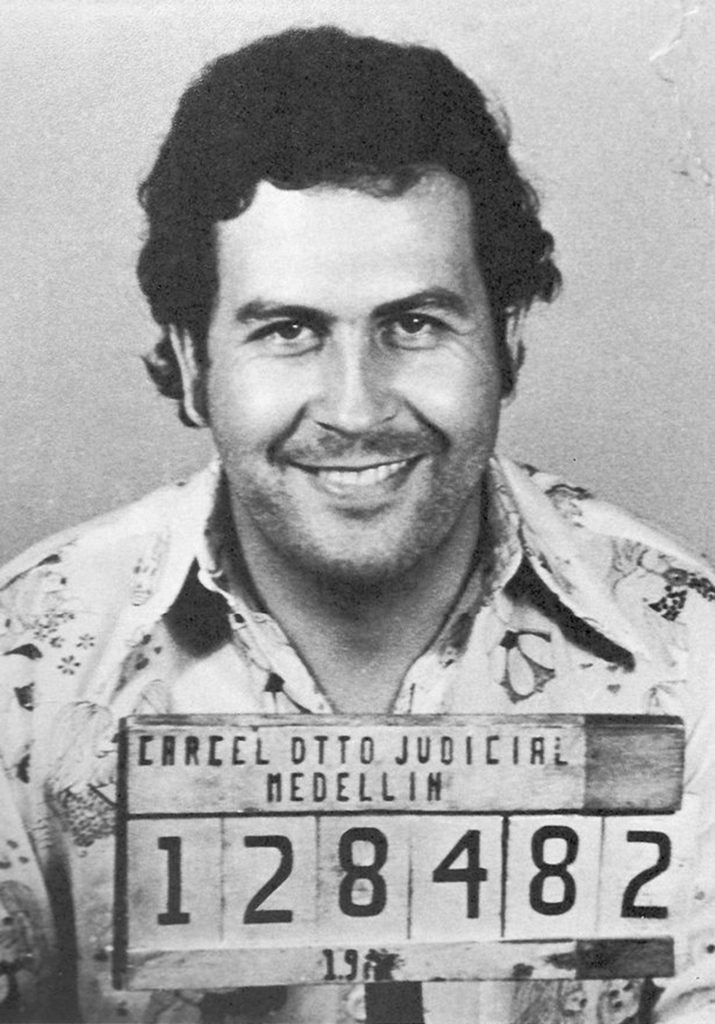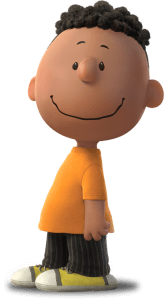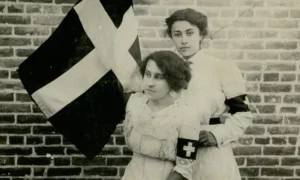
Pablo Emilio Escobar Gaviria was one of the most notorious villains of all time and is known as “The world’s greatest outlaw.” Escobar was born on December 1, 1949 in Rionegro, a small village close to Medellín, Columbia. He came from an extremely poor family; he and his brother Roberto were once sent home from school as they could not afford to buy any shoes. He briefly studied at Universidad Autónoma Latinoamericana but was forced to leave as he was unable to pay the fees required. This was the point when his criminal career began. He and his brother allegedly stole gravestones and sanded them down to be resold. He then moved into other crimes, such as street scams and stealing cars.
In the 1970s, Escobar was introduced to smuggling by Alvaro Prieto, who was a local smuggler with many connections. Escobar then began to distribute powder cocaine himself, meaning he would make more money for himself. Escobar also established the first smuggling routes into the United States in 1975. His infiltration into the drug market of the U.S. expanded exponentially due to the rising demand for cocaine in the U.S. By the 1980s, it was estimated that 70 to 80 tons of cocaine were being shipped from Colombia to the U.S. monthly. His rise continued when infamous Medellín drug dealer Fabio Restrepo was murdered and all his workers were told that they now worked for Escobar, making him the head of the Medellín Cartel, one of the largest drug cartels in history. As the demand for cocaine in the US grew, so did Escobar’s empire. Escobar and his brother were soon organizing distribution networks through Panama, Bahama, and South Florida, among other areas in the U.S.1

At the height of his criminal career, Escobar and his cartel controlled over 80 percent of the global cocaine market. Escobar was the wealthiest criminal in history, with an estimated known net worth of US $30 billion by the early 1990s (equivalent to about $55 billion as of 2016). During the height of its operations, the Medellín Cartel made more than 70 million U.S. dollars per day (roughly $26 billion in a year), smuggling 15 tons of cocaine per day, with a street value of over half a billion dollars, into the United States. The cartel spent over $1000 per week purchasing rubber bands just to hold stacks of cash together to store in their warehouses. Ten percent of this cash had to be written off each year because it would be eaten by rats.1
During his early life, Escobar learnt that police were open to bribes, but as he became more powerful, he developed his own policy: ‘plata o ploma,’ simply meaning ‘silver or lead.’ This policy led to the death of hundreds of policemen and state officials, which solidified Escobar’s reputation as a cold ruthless killer as well as a drug lord. Escobar apparently said, “better a grave in Columbia than a gringo jail.” Being extradited to the U.S. was his biggest fear. After multiple failed attempts to capture Escobar, the government offered a $400,000 reward for whoever killed him. This resulted in Escobar declaring war on the Columbian government. His wealth was enough to start this war, as he offered a reward to anyone who murdered a police officer. Over 600 officers were killed, making Columbia the murder capital of the world in 1991 and 1992.1
However, there is another side of Pablo Escobar that we often fail to hear about, as it is clouded by all the bad things he did. He was always willing to give back to the people of Columbia. Many people in Columbia still believe that Escobar did a lot more to better the lives of the poor and less privileged than the Colombian government ever did. Many poor people in Columbia felt neglected by the government, whereas when Escobar was alive they had someone to help them. Coming from a background of poverty himself, he knew how tough life was for the poor, and always shared his money and wealth with the community. Escobar made sure everyone in his community was taken care of. He provided work and shelter for those who needed jobs or residences. Even to this day, Escobar is referred to as “The Godfather” or “Robin Hood” by his people because of the invaluable contributions he made for the society. For example, he constructed numerous housing projects so that everyone at least had a place to live. He is also responsible for establishing and funding soccer teams and leagues in Colombia as well as building countless numbers of churches, hospitals, and schools across the country. He advocated education for the children.4
There are two completely different sides to the story of Pablo Escobar. Most people know the story of a ruthless, atrocious criminal that ruined and took the lives of countless numbers of innocent victims. On the other hand, by some, especially the working class in Columbia, he is thought of as a very respectable human being who made irreplaceable contributions and gave back freely to the community genuinely out of his good will to better the lives of the poor and less fortunate. A large amount of the working and lower class of Columbia are grateful to Escobar because of all the things he did for them. Escobar came from nothing and made something out of his life, and although what he did was illegal, he used a large portion of his proceeds towards good causes. Escobar wanted to make Columbia better and improve the quality of life for the people. Although he achieved this through criminal activity, he did achieve his goals. During the era of Escobar, Columbia’s quality of life was on the rise.5
However, the good things Escobar did do not make up for all the innocent lives that he ended. Some people think that the Columbian government is partially to blame for the deaths of the officers by putting so many on the front line to try to capture him. Escobar was so powerful that he had so many people willing to fight against the officers for him that many of the officers had no chance in a firefight against the cartel. It is a matter of opinion as to how people see Pablo Escobar. Most people see him as a major criminal; however, many people in Columbia still believe that Escobar used his wealth for good intentions.
- Global Events: Milestone Events Throughout History, 2014, s.v. “Pablo Escobar Dominates the International Cocaine Trade,” by Jennifer Stock. ↵
- Global Events: Milestone Events Throughout History, 2014, s.v. “Pablo Escobar Dominates the International Cocaine Trade,” by Jennifer Stock. ↵
- Global Events: Milestone Events Throughout History, 2014, s.v. “Pablo Escobar Dominates the International Cocaine Trade,” by Jennifer Stock. ↵
- Ron Chepesiuk, Escobar Versus Cali: The War of the Cartels (South Carolina: Rock Hill, 2013), 48-50. ↵
- Aldona Bialowas Pobutsky, “Peddling Pablo: Escobar’s Cultural Renaissance,” Hispania Vol. 96, No. 4 (December 2013): 684-699. ↵



70 comments
Ximena Mondragon
The article overall is informative and it gives two sides of a very popular drug lord.I really enjoyed this article because it made me think of the show Narcos on Netflix. Like the show this article shows the two sides Escobar had in Colombia. The article gets to the point and gives details of Escorbar’s life. It was very interesting to learn about his early life since I didn’t know much about it. It explains why he tried to help out the poor which made him really popular in Colombia.
Kayla Lopez
I was so used to constantly only hearing about all of the atrocious and terrible things Pablo Escobar has done that it was almost hard to believe all of the great things is was able to accomplish for his community. I did not know that he funded the establishment of many churches, hospitals, and schools across his country. There was a great amount of information in this article that I did not know about.
Iris Henderson
This story discusses the different view points of the reputation Escobar made for himself. I really enjoyed that the author left it to the reader to decide, kind of what side they would take. I did learn a few things about Escobar that I didn’t already know, like the fact that his networth was 30 billion USD in the nineties. I also was unware of how many major contributions he made to Columbia, like the schools, hospitals, and housing.
Regina De La Parra
I enjoy reading about narcos stories a lot because of how crazy their lives are. Of all of the narcos, I have found a lot of interest into learning about Pablo Escobar and how much damage he did. Today there are a lot of books, movies, and tv series tend to exalt narcos and make them appear as they were not as bad as they truly are. I believe that it is very important to really learn about them as they are and never forget all of the bad things they have done for humanity. Great article Ryan!!
Reese Lujan
I love Pablo Escobar everybody portrays him as a bad guy because of his affiliation with the cartel and El Chapo, but everybody fails to realize the good he did to the people of Columbia. This article confirms the good he did and doesn’t just focus on the bad he did. People fail to realize that with money, power, and responsibility comes sacrifice.
Arianna Kennet
Very interesting article on Pablo Escobar. Prior to reading this I also only knew of the bad and negative‘s having to do with Mr. Escobar, he is a king pen drug dealer on the status of El chapo. He was a multimillionaire who went to war with the police and basically built his own army of man for his protection. However, I never knew all the good things he has done such as building schools and advocating for children’s education. I have always found it interesting that so many people in life that we look at is completely evil sometimes I looked up to by others.
Belia Camarena
I have always known Columbia to be one of the main drug distributors in the world, but I never knew that the man behind this was Pablo Escobar. It is sad to think that his career in crime started from a need for money, and it makes me wonder how his life and Columbia’s history would be different if someone had outreached to his impoverished family and gave them a hand. However, nothing can be changed, and it is clear that Escobar did more harm than good.
Michael Thomas
I found this article interesting because of how it explains Pablo Escobar’s background and the side of him that no talks about. Although Escobar had a brutal background, I did not know that he used his money to build up Columbia and help the people. Even though he was a brutal cartel leader, he still had good intentions for his country.
Auroara-Juhl Nikkels
People aren’t all good or all bad, and Escobar embodies this. He committed heinous crimes, not just killing massive amounts of innocent people, but also by how much drugs he was bale to get out into the world. He killed probably millions of more people with the drugs that he sold. On the other hand, he gave back to the community, to the poor. He built schools and hospitals, and advocated for the education of children. But his good acts do not out weight all the death and pain he caused with his drug cartel.
Hannah Wilson
I did not know very much about Pablo Escobar until I read this article. It was interesting to hear about both sides of the story. I still think he is a ruthless killer because it is really brutal to put a kill order out on police officers. It was interesting that most of the poor in the community found him to be a type of robin hood. Good article overall.